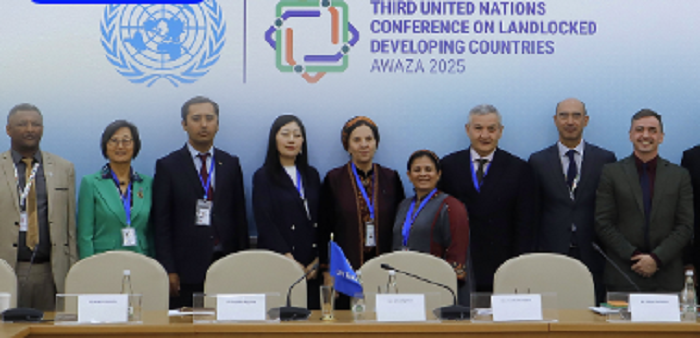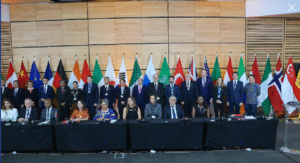Landlocked developing countries focus on tourism, 50 million tourists in 2024

Travel Biz News —
Tourism was in the spotlight as a powerful lever for structural transformation at the Third United Nations Conference on Landlocked Developing Countries (LLDC3) held recently in Awaza , Turkmenistan.
Hosted by UN Tourism, the side event “Tourism: Driving Economic Diversification and Inclusion in LLDCs,” brought together government representatives, UN agencies, and bilateral development actors to explore how sustainable and rural tourism can diversify economies and boost social inclusion across landlocked developing nations.
According to UN Tourism, LLDCs welcomed 50 million international tourism arrivals in 2024, or around 3.5% of the global total. However, their share of international tourism export revenues stood at just 1.4%, pointing to untapped potential and a need for resource mobilization, enhanced value, and policy innovation to grow the average income per arrival, which currently stands at USD 445 in LLDCs compared to USD 1,182 worldwide.
In the priority areas of the Awaza Programme of Action (APoA) 2024-2034, tourism plays a significant role for LLDCs, specifically when it comes to structural transformation, private sector development, foreign direct investment, transit, transport, and connectivity. Among the tourism-related targets to be achieved by 2034, the Programme of Action commits to doubling the output of service sectors, including tourism, while fostering cross-sectoral linkages between tourism, agriculture, creative, and cultural sectors.
The event featured a high-level panel with representatives from Turkmenistan, Uzbekistan and Tajikistan, the UN Food and Agriculture Organization (FAO) and Japan International Cooperation Agency (JICA). Together, they discussed best practice policies and initiatives to accelerate sustainable tourism development in LLDCs. The need for expanding infrastructure, community participation, capacity-building for MSMEs, responsible tourism, product development, and deeper collaboration between the public and private sectors was highlighted.
Zoritsa Urosevic, Executive Director of UN Tourism said: “Landlocked Developing Countries are extremely rich in cultural and natural assets that the world is eager to experience. However, many face important challenges namely in terms of connectivity. Tourism offers a unique opportunity to diversify economies, empower communities, and create sustainable livelihoods, particularly through tourism for rural development. Together, we can make tourism a strategic pillar for resilient and inclusive growth in LLDCs and a key service sector in line with the Awaza Programme of Action.”
The event concluded with a presentation on UN Tourism’s Tourism for Rural Development Programme, which is designed to accelerate tourism as a driver for rural development and community well-being. Under the Programme, Member States and rural communities are supported through initiatives such as the Best Tourism Villages by UN Tourism, a self-assessment tool to assist rural destinations, and the Small Grants Programme currently piloted in Africa and enabled by Tui Care Foundation.
Key Recommendations
The UN Tourism side event at LLDC3 identified a set of strategic recommendations to advance sustainable tourism as a driver of economic diversification and inclusion in Landlocked Developing Countries:
Advance tourism as a key pillar of economic diversification, particularly through rural, nature-based and cultural tourism that promotes employment creation, entrepreneurship, and inclusive development.
Foster cross-sectoral linkages between tourism, agriculture, creative industries, cultural heritage, and nature conservation to enhance value chains and unlock new income opportunities and market access.
Improve infrastructure, transport, and cross-border connectivity to facilitate seamless travel, particularly air travel, strengthen territorial cohesion, and regional integration.
Support MSMEs and community-led tourism initiatives through responsible product development, sustainability-focused capacity-building, and inclusive policy frameworks.
Establish and expand financing mechanisms, including small grants and public-private partnerships, to empower grassroots actors and scale up sustainable tourism models.- UN Tourism
9 August















